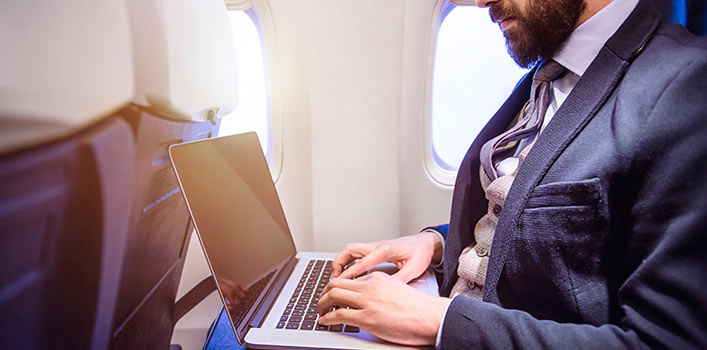Being hacked is a concern for most of us nowadays. You can’t skim a newspaper without seeing some security breach, not to mention it was a major point of contention during election time.
Were elections at risk from foreign hackers? Were emails read? We’ll save the political arguments for another time, but data security is a large concern, particularly when you’re traveling and possibly using public networks.
If you want to protect yourself, you need to worry about a two-pronged assault–public networks and prying eyes. Here’s how to avoid issues with both.
8 Ways to Prevent Getting Hacked When You’re On the Go
Bring your own secured network.
Public networks are always at risk. If you have the means to do so, bring your own secure hotspot.Avoid certain activities.
If you don’t have access to a private network, avoid activities that would expose your private information to the world. Don’t pay bills on the road, shop online, access non-public company files, or use forms that contain personal information. Remember, even your hotel network that gives you a password is a public network because everyone gets that password.Invest in a security/privacy screen or filter for your computer.
Even with a secure network at your disposal, if you are near someone else, they can be stealing information off of your screen without you noticing it. These privacy screens place a glare on the computer and only the user seated directly in front of it can see the contents on the screen.Access your files over a virtual private network (VPN).
A VPN extends a private network over a public one, so you can access company information through a public network like an airport without giving up data security. Many companies have these so if you plan on traveling, ask your tech group about accessing your files through a VPN.Don’t access your password document via a public network.
If you’re one of the many people who keep your passwords in an electronic file entitled “passwords” (please tell us you don’t), don’t access it from an unprotected public network. Ever.Ensure you’re running all the latest updates.
One of the easiest precautions to take before traveling is to ensure all of your software and your operating system updates have been performed. If not, make the time to do it. These companies don’t release updates for fun. Many times they patch some weakness that has been uncovered. Don’t put it off until you return. That could be a very costly decision.Disable the file-sharing option.
Many laptops have this feature and it’s disabled by default but if you’ve turned it on, disable it before you travel. If you don’t, anyone sharing a network with you at the airport, your hotel, or McDonald’s can suddenly access your files.Set up a two-step verification process.
Setting up a two-step verification process means that you have to enter a second code, outside of the password, if you’re accessing the site from a different device. You will also be notified. For instance, if you log into Google from a device that your account doesn’t recognize, like a public computer, you will be prompted for an additional code, and an email will be sent to your account advising you of this.
Getting hacked can turn a successful business trip into a disaster. Protect your accounts and your identity by taking these precautions.
But traveling isn’t the only time you need to protect yourself from hacking. You need to protect your business too. With the influx of employees bringing their own devices and accessing your network, you may be more vulnerable than you realize. Contact CIO Tech to discuss how we can help protect your business with managed IT services.


